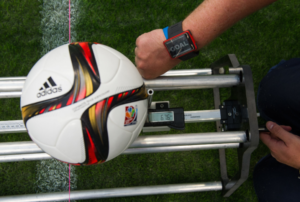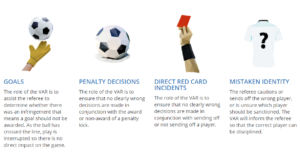Soccer vs technology? Soccer and technology? – The evolution of FIFA and what is next
Soccer is the most popular sport on earth with an estimate of 3.5 to 4 billion fans worldwide (1) (2). Traditional and conservative by design, FIFA is the governing body in charge or all organized competition worldwide having inference at the national teams level but also the local leagues. Every 4 years, the FIFA World Cup is played at a host nation with 32 nations playing for the final prize. The world cup has a long history of controversies regarding bad decisions from the referees which has caused major shifts in the history of the tournaments with ghost goals, bad disciplinary calls and overall major omissions to the tournament rules. Other leagues around the world have been working with technology assistance since 1991 such as the MLB, the NBA and the NFL in different facets of the game however “former FIFA President Sepp Blatter said in 2002. “Players make mistakes, coaches make mistakes and yes, sometimes referees make mistakes. But football is passion, football is emotion. Football has a human touch.” (3)
Now, with Blatter out, a revitalized FIFA is finally finding small ways to incorporate technology into the game. One of the first trial happened during the World Cup of Brazil 2014 when the GLT (goal line technology) was put in place. With multiple variations on how the technology works, the principle is simple, to clearly define if the ball crossed the goal line while sending a notification to the referee’s watch. (4). The technology caused some controversies during its first official tournament however it eliminated one of the long issues surrounding the sport, false goals.

For Russia 2018, FIFA took technology one step further by incorporating the use of the Video Assistant Referees or VAR. The concept is simple and cheaper than the GLT given it uses the same cameras that are being used for the game broadcast to help the referee determine the right way to proceed for the following 4 scenarios(5):
- Goals awarded or not
- Penalty decisions
- Direct red card incidents
- Mistaken identity – the right player is sanctioned

The VAR is driven by a set of referees who are reviewing the game at a control center, if something is noticed on the monitors, they communicate directly with the referee at the field who then goes and reviews the footage himself. At the end, the decision is still for the referee to make based on the interpretation of the video, also, the timeliness factor is key given in soccer the clock never stops. As with any major change, there has been controversy around the delays it will bring to the game and the elimination of the human factor.
Technology is also making it now to the gear and apparel. For the Russia World Cup, Adidas launched the Telestar 18 soccer ball which for the first time ever contains the NFC chip (Near Field Communication) (6). This technology allows the ball to communicate with other devices such as tablets and cell phones, providing content to the end user. At this point, the chip is still passive and it is just triggering an action on the reading device, opportunities are endless however the app development, the data processing and the end results are still to be seen.
It is hard to imagine where technology will take the game in the next decades. It is encouraging to see that at least there is an open discussion about it among the decision makers and that steps are being taken to make the game fair and take the referees out of the equation. Just a couple of weeks ago, one of the broadcasters mentioned that eventually referees would become obsolete in the game, I am honestly not sure that can happen however nothing surprises me anymore.
In 2004, the biggest sports scandal in the history of Italy was unveiled when charges against the multi-champion “Juventus” were made public amid allegations of bribery to referees and doping. It showed the world how money could corrupt the most beautiful game on earth by buying the referees during the league regular season (7). Sanctions were placed, people were fired but the sport was stained. As a fan of the game, if technology can prevent these disastrous situations from happening again I will be more than satisfied. At the end, it is all about the best team winning!
References:
- https://www.topendsports.com/world/lists/popular-sport/fans.htm
- https://www.totalsportek.com/most-popular-sports/
- https://www.engadget.com/2017/08/01/fifa-var-goal-line-technology-future-of-soccer/
- https://www.theguardian.com/technology/2014/jun/16/world-cup-goalline-technology-football-brazil-2014
- https://football-technology.fifa.com/en/media-tiles/video-assistant-referee-var/
- https://www.adidas.com/us/b/soccer/telstar_18/faq.html
- https://www.sportskeeda.com/football/calciopoli-2006-match-fixing-scandal-juventus-relegated
6 comments on “Soccer vs technology? Soccer and technology? – The evolution of FIFA and what is next”
Comments are closed.


Great post Victor. Which match(es) did you get to see? I was rooting for Mexico too.
I think GLT and VAR have been great additions to the game. I know the football community resisted technological changes for so long (the game should be the same wherever it’s played!), but I’m happy with the changes. I’d love to see VAR applied in some way to combat flopping. I’m sure FIFA could learn from the NBA in this area.
After watching so many PK shoot outs, I wonder if they’ll eventually apply VAR to keepers leaving their lines early.
Very interesting! I didn’t realize that all that technology was already being incorporated in soccer. I wonder if similar technologies can be applied to other sports as well. I know that tennis uses video replays to determine if the balls were hit in order out of bounds.
I also find the incorporation of machine learning in sports analytics to be very cool. One application is the prediction of game results. For example, recently there was a competition that was sponsored by Google to predict the results of March Madness from previous years’ tournament results. However, that almost seems kind of silly to me because there are so many factors that can affect a game that algorithms might not be able to take into account. Another application is using statistics and numbers to determine how coaches should manage and train players and which players to let onto the field during certain situations. Will sports become more and more or a numbers game in the future?
good point, I know baseball started using it for home runs very effectively.
On the analytics side sports is definitely finding a big niche. It goes all the way from the “money ball” principle in baseball to the scouting, training, recovery and gambling of course. Coaches are getting more and more tech savy and data driven individuals which is no different to what we do in manufacturing, banking, etc.
Hello Victor,
Great article on how technology is increasingly making its way into the world of sports. As a huge soccer fan, I have to admit that I was very happy with the recent changes in terms of the video assistant although I personally wanted it to be used by referees more frequently (referees would still not check all the crucial incidences on the monitor). Also, I would love to see other aspects of the game to be enhanced by innovative gadgets/devices/systems that reduce the uncertainty in the decisions of referees. For example, an offside assistant or smart shirts that return feedback to referees when pulled hardly (indicator for a foul) could be introduced on besides today’s video assistants. I truly believe that there will always be a human touch to the game even if we adopt more technological equipment in the future. Hopefully one day, we will see a game of football in which no single false decision is made and two teams can fight for the win without external disadvantages.
Interesting and topical take on soccer and technology! I liked the examples that you provided, and showed in this article on how technology can indeed be linked to sports, and help reduce the human errors that we see in soccer, for example. I think incorporating video assisting in FIFA World Cup 2018 was a great innovation, and I am looking forward to see other enhances on technology in the future.
Great article to dive into how technology has finally arrived into soccer. It clearly is an opportunity to make the sport fairer for the teams competing and to catch up with other sports that included some sort of technology some time ago. Tennis, for example, has been using the Hawk-Eye technology for several years now. In the soccer case, although the VAR was controversial during the World Cup, I think it was a clever way to use technology but still keeping the traditional referee in the field. For sure was not perfect and could be improved, but I personally think that if referees are completely substituted by computers the game itself will lose some of its appeal.